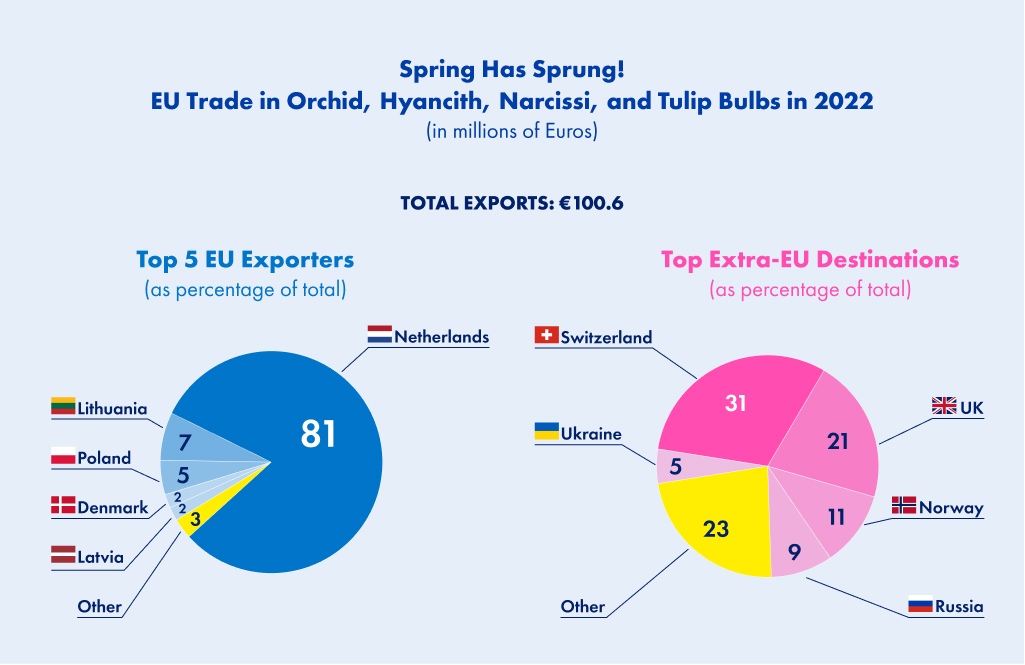Issue #124
Guten Morgen! We’re delighted to welcome you back to the Krautshell following a short Easter intermission. This week, Mats takes French President Macron’s comments about China and Taiwan under the microscope in the House’s View. We hope you like some royal humor… Then, take a peek at our main articles to learn about Germany’s cannabis legalization plans, the impact of the US’s leaked military documents for Europe, and the seemingly never-ending saga that is the EU’s AI Act. Finally, enjoy Szilvia’s WOOM where she gives her unfiltered view of Germany finally shutting down its last nuclear powerplant. Happy reading and happy weekend! Anna Szilvia Germany’s Foreplay with Cannabis Legalization The German Federal Ministries of Health, Justice, and Agriculture have agreed on a draft plan for legalizing cannabis for adult use, which was released on April 12th. While this move was expected for some time now, considering the governing Traffic Light Coalition announced their intentions to do so in their coalition agreement, what came out on Wednesday was slightly different than many had been expecting. Here are the details. Germany’s plans involve a two-pillar model framework for cannabis regulation. A first step will allow adults to form clubs for community cultivation with up to 500 members. This concept isn’t new – other EU countries like Spain also have these cannabis clubs. On one hand, these clubs allow member states to circumvent EU law (which forbids the sale and distribution of cannabis) as they are matters of private use, which fall under national jurisdiction. On the other hand, these clubs are unlikely to make a dent in the black market. To be honest though, this seems like the perfect solutions for Germans, who take every possible opportunity they can to form a Verein. Some of our favorite examples include the Network of Asparagus and Berry Associations, the Bobby-Car Sport Association, and the Scythe Association Germany (watch out, Grim Reaper). The second pillar will establish a 5-year model project for commercial supply chains where companies can produce, distribute, and dispense cannabis in licensed and government-controlled specialty stores. The ministers also said the legislation foresees amnesties for people who have previously been convicted of cannabis possession, but they didn’t specify who would be eligible for the amnesties. So at this point, it’s safe to assume that all those who were arrested for up to five years for cannabis possession will be released and compensated for lost time. So, if someone worked for 8 hours a day for 5 years at 12.50 euros per hour without any public holidays and weekends in Germany, their earnings would be approximately 130,000 euros. Ain’t that a sweet deal? Oops, I Leaked It Again While Macron’s Taiwan remarks caused outrage among our transatlantic allies, the leak of more than 100 US intelligence documents is causing unrest on our side of the Atlantic. The documents disclose sensitive information on the war in Ukraine, including warfare strategies and European weapon deliveries to Ukraine. Here’s what the documents reveal about Europe’s actions (however, it must be noted that not all the content has been verified and some of the documents, according to US officials, seem to be modified): As Politico reports, the leaked documents reveal that a group of 97 special forces, dominated by the UK, is operating in Ukraine alongside personnel from the US, Latvia, the Netherlands, and France. The exact mission of this special force, however, remains unclear. Moreover, France and Italy’s joint missile system will not be ready until June, despite Italy promising to deliver it in the spring of 2023 for the anticipated spring offensive. The documents also suggest that Hungary may be secretly allowing allies to use its airspace to move arms towards the battlefield, despite pledging to bar such transfers. According to the document, Germany was only committed to providing four of the Leopard 2 tanks, but Berlin announced in late March that it had actually delivered 18. This either means that the documents did not contain the latest information – or that Germany once again lags behind its promises. While some experts have raised concerns that other countries may become hesitant to share intelligence with the US, it is unlikely that this will happen. US intelligence services are among the best in the world, and Europe is heavily dependent on US intelligence for national security. For example, in Germany, many terrorist attacks have only been prevented thanks to tips from US intelligence services – not our own. 27 EU Countries, 1 AI Regulation: Mission Impossible? The growing importance of AI in EU citizens’ daily lives presents the European Union with an increasing challenge – namely, to find a unified European approach to dealing with a technology that is evolving so rapidly that while EU lawmakers are discussing ChatGPT 3.5, version 4.0 has already been released. The EU is complex. Members of the European Parliament met on Thursday to discuss critical aspects of AI regulations. And while the representatives can slowly agree on a position for the committee meeting planned for April 26th the later adoption by the plenary is uncertain. That being said, the toughest nut to crack seems to be diverging opinions among the member states, making a unified approach more difficult. Recently, the Italian data protection authority’s order to prohibit personal data of Italian citizens from being shared with OpenAI drew attention. At the same time, the authority asked ChatGPT to comply with European data protection. In France, investigations against AI were also initiated for similar reasons. The Italians asked OpenAI for information on how user data is used for ChatGPT and what legal basis is used for processing personal data. The European response to the complaints of its member states was the establishment of a task force to ensure a uniform application of the regulations and to promote the exchange of information on possible enforcement measures. Finally, to further complicate the whole situation, the EU and member states are uncertain about who has which competence. Reminiscent of the COVID pandemic, member states continue to rely more on their national capabilities to respond to sudden questions – certainly because finding a European solution is often a slow process. In this regard, Frederico Oliveira da Silva, a Senior Legal Officer at the European Consumer Organisation (BEUC), stated that the AI law will not be applicable for several years and that it is crucial to protect consumers in the meantime. Source: Eurostat THE HOUSE’S VIEW: by Mats Macron to Fill the Void Recently, I’ve been watching quite a bit of The Crown on Netflix. While I would never dare to compare such a perennial, lavish institution like the English monarchy to modern-day European politics… ah who am I kidding, that’s exactly what I’m going to do. Just stay with me here. In the show, the Queen departs on a multi-month journey of the Commonwealth, handing her royal duties over to her sister who has always felt like she was in Elizabeth’s shadow. She seizes the opportunity to do things her way – sharing her political opinions, making jokes in public addresses, and even undermining her sister vis-à-vis politicians (all of course unacceptable behavior in the royal household…). The point here being: the Queen’s absence leaves a vacuum, and other members of the family are more than happy to fill the empty space in their own image. (Speaking of the Queen’s absence… may she rest in peace… do check out our recent Royal #THEÜBERSICHT telling you everything you didn’t know you needed to know about the monarchy leading up to Charles’s coronation) Filling empty spaces left by departing leaders, seizing the opportunity to do things “your way,” I couldn’t help but draw parallels to what happened between European leaders this week as French President Macron, Commission President von der Leyen, and German Foreign Minister Baerbock all traveled to China. His Royal Highness Emperor Emmanuel I of Elysée Has Spoken Whether it’s pushing through pension reform without Parliamentary backing, scrapping the wealth tax, or thumbing his nose at American hegemony, President Macron is the modern-day equivalent of l’état, c’est moi. More so than most politicians, he is convinced his policies are the correct ones, and doesn’t care much for the backlash his decisions create. This personality trait was on full display this week, as Macron used his trip to Beijing to present his vision for European foreign policy – and pass it off as a joint vision between the EU and its Member States. Specifically, that Europe should not follow the US’s foreign policy, particularly when it comes to China and Taiwan. To quote the French President, Europe must not get “caught up in crises that are not ours, which prevents it from building its strategic autonomy.” To add on, he explained that the worst thing Europe could do was to become “America’s followers.” Two individuals who clearly were thrilled about Macron’s comments were Commission President Ursula von der Leyen and Council of the European Union President Charles Michel. Both have continuously pushed for greater European sovereignty, and the French President’s comments were essentially free advertising for their own positions. Michel even used the opportunity to jump on a French television show to echo Macron’s remarks. Germany Caught with its Pants Down One person who was significantly less thrilled was Germany’s Foreign Minister Annalena Baerbock, who is in Beijing as I write this article, separately from the other two leaders. Macron’s interview put Baerbock in an uncomfortable position as in the current geopolitical environment she couldn’t outright disagree, but also couldn’t simply let Macron’s comments stand. To be fair, Baerbock handled the challenge quite smoothly. On Wednesday, in Tianjin, Baerbock decided to take the path of least resistance. She underlined that France’s China policy mirrored that of the EU, and that a conflict in the Taiwan Strait would be disastrous. Essentially: unity and peace. Then, as the shock from Macron’s comments wore off Baerbock became harder in her tone towards her Chinese counterpart. The House’s View: Give a Man an Inch… Why this? Why now? One simple answer: German Chancellor Olaf Scholz. Or at least that’s what I think his name is. I kind of forgot because he hasn’t showed his face in months. But in all seriousness, Macron has gotten a whiff of the open road and he’s putting the pedal to the metal. Before Scholz became Chancellor in 2021, Angela Merkel was unrivaled in her influence – and she quite often got her way. She was a champion of multilateralism, trusted and respected by China, Russia, and the US. With a presence like hers, French Presidents had no other option but to take a back seat. Many speculated that Olaf Scholz would simply take the baton – but he’s been missing in action. Therefore, Macron feels emboldened to be Europe’s voice. Him sticking to a long-held tradition of French leaders mistrusting the Americans surely wins him some brownie points at home. That’s all well and good. For France, not for Europe. What I would hope though, is that Monsieur le Président recognizes that we are no longer in 2017. If he truly believes what he is saying about Europe being strong, he must tone down the anti-American rhetoric. Europe is in no position to function on its own – economically or militarily, and a strong democratic front with the Americans and other NATO allies is needed to keep his preferred world order alive. To get out of Queen Elizabeth’s shadow, her sister felt she needed to be outrageous. In the end, the Queen simply skipped over her sister when she needed someone to replace her, entrusting future royal duties with her mother instead. The result was an erosion of trust, media speculation about a rift between the two, and I can imagine some very awkward dinners. Comments like Mr. Macron’s strengthen those who don’t share liberal democracies’ world view, as they see the rifts between allies. I hope we don’t see the consequences of his actions. German flower power plant As of today, Germany is officially a nuclear-power-free country. The last three power plants have seized electricity supply today, after the initial decision taken by Angela Merkel’s (CDU) government to phase out this technology after the Fukushima nuclear disaster in 2011. In some imaginary world, it could have been a Grimm’s Märchen, a happily ever after. But facing reality: 2022 changed everything. A long-term policy strategy built on new empirical learnings and a booster for the renewable industry unequivocally has become an ideological pet project of one party, the German Greens. Cutting off a CO2-free energy resource midst an ongoing energy crisis and a not-so-easy fight against climate change is plain dumb. Energy ministry Habeck (Greens) is in a difficult situation, no question. Would he have given in to the pressure from the liberal coalition partner and generally speaking common sense, and allowed further prolongation of the reactors, it would have been an attack on the core identity of the Green party: radical nuclear opposition. Plus, German green ideology does not stop at the border, annoyingly pushing its European partners to follow the lead. The rigid position in Berlin triggers France, and former partners now have difficulties finding compromises in European legislation, like the 2030 renewable energy targets: only a long pillow fight resolved the question whether to count nuclear as clean energy or not. Looking at the Green’s determination to end nuclear in Germany, one wonders: Is it really about shutting down a dangerous energy source? Is it means to boost renewables, as the only acceptable energy source? Or is it just some errant obstinacy, an inability to change one’s opinion in the view of a changed world? Firing up coal plants, extending lignite plants and importing nuclear energy from our neighbor countries while shutting down some of the safest reactors and consistently failing its CO2 climate targets strongly clearly point to the latter. Issue #124


FIRST, SOME SOLID INTEL:
TAKE A BREAK, GIVE YOUR EYES A REST.

LONG STORY SHORT:
WHAT’S ON OUR MINDS:





